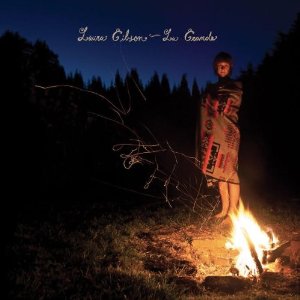2011 saw a lot of music gone glutinous, artists gravitating together into some essentialness of their genre; we had a lot of white girls rubbing up against beatboxes, a lot of blubby dubby wubbing widdle wunderkinder, a lot of gassy synthpop. And as for folk: well, that’s always been a bit incestuous, hasn’t it?
This being so, when you see yet another befringed American woman cresting over the horizon with acoustic guitar held aloft, it is not abnormal to go indoors and put the bolt on. By all indicators Gibson is one of them: Northwestern, hop-a-long fingering, the Feist-like honks and downy alveolars of her vocals. Those who downloaded Gibson’s dazzling Daytrotter session in 2007 may have noticed that she was best appreciated in small doses: the previous year’s If You Come to Greet Me meandered between the liquidly comforting (‘Hands In Pockets’) and the cloying (‘Country Country’).
But since then she’s dabbled in ghostliness and strings and not lost that compelling something about her. Her potential makes her difficult to walk away from: her next move is always potentially something you’d regret missing.
Et voila: from its first few seconds La Grande is a swift kick in the arse of what went before. In the title track Gibson is a slippery witch, growling like a Casady sister over a tangle of drums and harpsichords. ‘Milk-Heavy, Pollen-Eyed’ is a characteristic lullaby, but fuller, with its bracing wind section and tidy whips of percussion. (The Dodos lend a hand here somewhere – conceivably everywhere.) In ‘Skin Warming Skin’ there’s a possible curtsey to Our Lady Joanna in the lyrics, "it’s only skin / warming skin" before she launches into a cawing, cowboy epic of a refrain that serenades outback Oregon as powerfully as Newsom does California.
And when the singer wraps herself in gramophonic crackles, as on ‘The Rushing Dark’ and ‘Feather Lungs’, and hums along with herself like the very notes are delicious, that secret compelling ingredient finally reveals itself. It’s the eternal whatchamacallit of American folk: a bluesy authenticity, a sort of (wince and bear it) soul, I suppose. Gibson would sound as sweet during the Great Depression as she does in 2012, and she carries with her an optimism that doesn’t ignore this mess we’re in but instead cradles it and coos.
"Time is not against us," she sings on ‘Time is Not’, her tone ineffably sad, like a mother lying to her child. It’s the loving kind of lie that you tell to make it true. That’s La Grande, a homage to a majestic West that’s largely losing its majesty. That’s Gibson sounding freer and better than she ever has before – truthing through her goddamn teeth.


